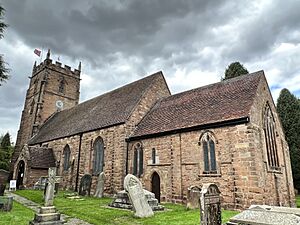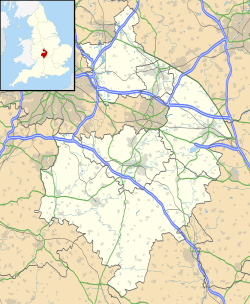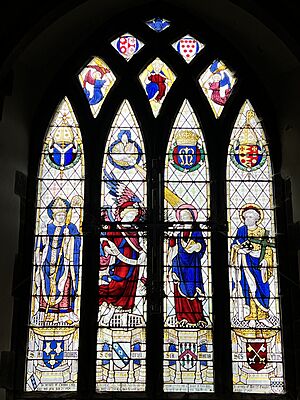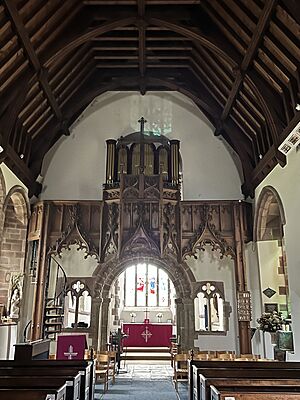Church of St Nicholas and St Peter ad Vincula, Curdworth facts for kids
Quick facts for kids SS Nicholas and Peter Ad Vincula, Curdworth |
|
|---|---|

SS Nicholas and Peter Ad Vincula, Curdworth
|
|
| 52°31′58″N 1°44′22″W / 52.5328°N 1.7394°W | |
| Location | Curdworth |
| Country | England |
| Denomination | Church of England |
| History | |
| Dedication | St Nicholas and St Peter ad Vincula |
| Dedicated | 2007 |
| Consecrated | 1450 |
| Architecture | |
| Heritage designation | Grade II* listed |
| Administration | |
| Parish | Curdworth, Middleton and Wishaw |
| Deanery | Sutton Coldfield |
| Archdeaconry | Aston |
| Diocese | Birmingham |
| Province | Canterbury |
Welcome to the fascinating history of St Nicholas and St Peter ad Vincula Church! This historic church is located in the village of Curdworth, in Warwickshire, England. It is named after two important saints: St Nicholas and St Peter ad Vincula.
Contents
History and Design of the Church
The main part of St Nicholas and St Peter ad Vincula Church was built a very long time ago. It dates back to the Norman period, between 1170 and 1190. The church officially started in 1165. This was when a group of monks, the Augustinian Canons from the Abbey of St Mary de Pratis in Leicester, were given the right to choose a priest for the area.
Building Changes Over Time
The church was made longer in the 1300s. Later, around 1460, a tall tower was added. This tower was built in the Perpendicular style, which was popular at the time. It was added by the Earl of Warwick, a powerful noble. The tower was meant to have a spire on top, but it was never finished.
Restoration Work
Many years later, from 1895 to 1896, the church needed some important repairs. The roof was in bad shape, and the top of the tower was not safe. During this time, the church's organ was also fixed up. New choir stalls, where the choir sits, were given to the church by the Vicar of Milverton, Rev. M.M. Pope.
Ancient Discoveries
In 1895, during these repairs, something amazing was found! A carved stone font from the Saxon period was discovered. A font is a basin used for baptisms. This ancient font had been buried under the floor of the nave, which is the main part of the church. It was likely hidden during the English Reformation, a time of big changes in the church. Finding this font shows that a church has probably stood on this spot since Saxon times, which is over 1,000 years ago! This Saxon font has been used ever since it was found.
Beautiful Stained Glass Windows
The church has a beautiful stained glass window that was put in place in 1912. It was given by the Hon. Miss Adderley, whose father was Lord Norton. The top part of the window shows the symbols of the Lichfield and Worcester areas. Below that, there is a picture of Jesus Christ with two angels.
The larger sections of the window show two saints. One is St Nicholas, who is the first saint the church is named after. Above him are the symbols of the Province of Canterbury. The other saint is St Peter, the second saint the church is named after. Above him are the symbols of Birmingham. The artist who created this wonderful window was Geoffrey Webb.
The Churchyard and Its History
The churchyard is the area around the church where people are buried. It is believed that some soldiers who died in the English Civil War are buried here. Specifically, soldiers from the Battle of Curdworth Bridge might rest in this churchyard.
The churchyard also contains special graves for soldiers from more recent wars. There are war graves for six service members from World War I. Most of these were officers from the Royal Flying Corps, which was an early air force. There are also three war graves for service members from World War II.
The Church Bells
The tower of the church holds three bells. The largest bell is called The Mary Bell. It is very old, dating back to the 1400s. Legend says this bell was given by a traveler who got lost in the Forest of Arden. The sound of the bell guided them safely to Curdworth, and they gave the bell out of thanks.
The second bell was made in 1756 and has "Thos. Eayre de Kettering" written on it. The third, smallest bell, is inscribed "Edward Astley 1663. Thomas Wilcox". All three bells were repaired and restored in 1905 by Lord Norton.
The Church Organ
St Nicholas and St Peter ad Vincula Church has a pipe organ with two keyboards. The organ was rebuilt in 1896 by a company called Bamfield and Son from Birmingham. You can find more details about this organ on the National Pipe Organ Register, which lists information about organs across the country.
Interesting Sculptures
Inside and around the church, you can find several interesting sculptures. One is an angel statue that is now missing its head. This angel used to stand on the road bridge over the River Tame at Water Orton. It was placed there to help keep travelers safe on their journeys.
Inside the church, there is a special memorial for Lancelot Mitchell. He was a priest and rector of the church from 1905 to 1937. The statue shows Melchizedek, a figure from the Bible who represents priesthood. This sculpture was designed by Holland W. Hobbiss and carved by William Bloye. It was put in the church in 1950.
External Links
- St. Nicholas and St Peter ad Vincula in Curdworth, Warwickshire
 | James Van Der Zee |
 | Alma Thomas |
 | Ellis Wilson |
 | Margaret Taylor-Burroughs |




